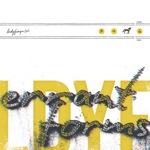What a beautiful surprise; seven years after Anti-Anti (which I still listen to regularly), Snowden returns in top form on No One In Control, hitting all the marks you might want based on their past work, and subtly expanding on it, too.
 |
     |
The band’s bread and butter is a backbeat-leaning, dark new-wave dance jam, coupled with stuttering kick/bass rhythms and a droning key or guitar line (see “Hiss,” or “Not Good Enough”). They’re so good at these, they don’t get old. No One In Control also twists and stretches this template successfully, building the title track up slowly over the course of seven minutes that could go on for twice that, integrating a cool, retro synth-stab sound with “The Beat Comes,” or dialing down Snowden’s usual burn to a simmer on “Don’t Really Know Me,” focusing rather than cutting its energy.
What can I say about the perfect “Anemone Arms?” Its simple, pure, eternal-but-counterintuitive theme? The beautifully understated arrangement? I invite you to give yourself over to it, especially if you’re in need of a moment of grace.
Every time I hear this record, I’m grateful Snowden made it.
 |
     |
I’ve tried for a couple weeks not to be disappointed by Errant Forms, unsuccessfully. But, I love Ladyfinger. Their show at the Riot Room a few months ago, with mostly material from the new record, was great.
In the end, though, “Dark Horse” is the only good song (and it’s really good) that shows any growth from the band. “Blue Oyster” and “He Said She Said,” relegated to the last two tracks of the album, adequately invoke the old Ladyfinger; the rest of the set is toothless and meandering, two words I never expected to use about Ladyfinger’s music. Plus, “Meathead” is simply embarrassing in its unintentional irony. It’s a dumb, reductionist song trying to snark at dumb, reductionist stereotpyes.
My expectation that this album would be something other than what it is is something I’ve been wrestling with and trying to suppress before forming a solid opinion about Errant Forms. One angle on art that I like thinking about is sussing the artists’ intention, and the extent to which they accomplished it. Other than from “Dark Horse,” I haven’t gotten any sense of why Ladyfinger made this record. It feels mostly checked out of its own existence. The guitars are muted and indistinct, and the drums are fussy and tapped. I think my disappointment has more to do with the specific recording, not the band or the songs (since the live set was energetic and a little edgy). I’d gladly trade my copy of Errant Forms for a bootleg of the Riot Room show.
As a Ladyfinger listener, I needed to know what this album was. It’s good to know, but I hope the next one has some bite.
 |
     |
Palms’ self-titled debut is exactly what you’d expect from the press blurb; a Chino Moreno (Deftones)-fronted Isis side project. Ambient metal, or some such. In spite of that, I like it a lot and have it in heavy rotation, but that doesn’t mean it gets a strong recommendation by MR|Review.
Nothing here will reach up and grab you. Overdriven, heavily delayed arpeggios permutate around Chino’s moans and steady, sometimes angular, rhythms. If you listen closely, you’ll notice details changing from section to section. Otherwise, it mooshes all together. Rinse, repeat. “Patagonia” is my favorite example.
The first half of closer “Antarctic Handshake” indicates a direction forward, should the group ever convene again. It has a straightforward dream-pop feel that, maybe blended 50/50 with the languid space-rock of the rest of Palms (start with the metal section of “Mission Sunset,” guys) and written into complete songs, could be noteworthy on a wider scale than “interesting metal supergroup side project.” I hope Palms makes that record, but in the meantime I’ll dig revisiting this one periodically.
 |
     |
Aesop Rock’s Skelethon is over one year old, but I won’t relax about it until I’ve done everything I can think of to convince you to check it out.
It’s basically a perfectly-executed record, with Aesop Rock rapping over his own intricately-constructed beats; arrangements as tight as German engineering, every ounce of sound aimed squarely at making your head nod *so* *hard,* and it never lets up. I’m jealous, in an inspired way, of how thoroughly Rock executes his singular vision and practically forces his point of view on listeners.
Ahh, words don’t do it justice. You have to bang this once, and then tell me if you don’t feel it.
 |
     |
Elder’s Dead Roots Stirring – is it or is it not metal? – is so inviting and infectious it should spill over from stoner/doom/desert rock silos. If you love this shit like I do, you’re welcome. If you don’t (yet?) but have the slightest interest, here’s a gateway.
Hitting the sweet spot between straight blown-out blooze and alternately broken and augmented psychadelic riffing, Dead Roots Stirring is that kind of heavy that puts a smile on my face. There’s a joy in volume, a release in mutual submission, and egolessness in waves of fuzz.
Twelve-minute guitar jams aren’t for everyone; I get that. Just don’t assume they’re not for you until you’ve listened to a couple good ones.
| MR|Review directs readers’ limited attention among works via ratings, and within works via prose, focusing on works where our opinion diverges from critical or popular consensus, or we have significant insight that compliments or challenges readers’ aesthetic experience. | MR|Review totals to date: | ||
| Must-hear! | 2 | ||
| Recommended | 13 | ||
| Good | 9 | ||
| Fans only | 10 | ||
| Skip this | 3 | ||
| Owww! My ears! | 0 | ||
